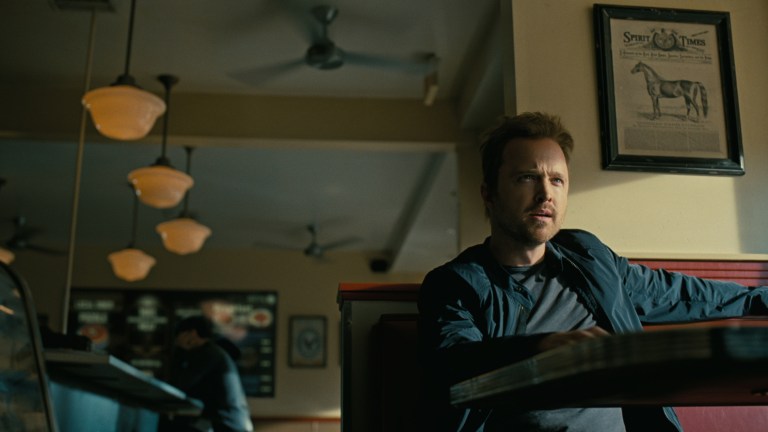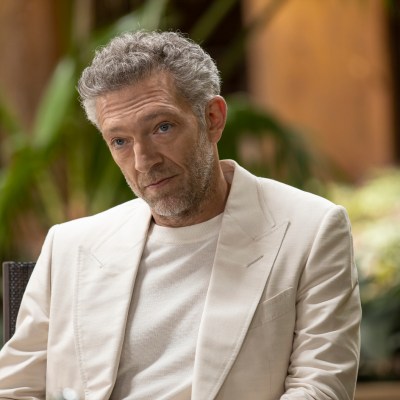Westworld Season 3 Episode 3 Review: The Absence of Field
Dolores begins assembling her team and planning her moves as Charlotte challenges her programming on Westworld season 3.

This Westworld review contains spoilers.
Westworld Season 3 Episode 3
One of the problems the hosts often ran into in the first season of Westworld was having their programming rewritten. Rather than wiping the memory completely, Delos just treats the host consciousness like a hard drive, keeping the operating system and general personality intact, then putting in whatever the new narrative is over top of the old one. For popular hosts, like Maeve and Dolores, the result was something akin to a constant state of déjà vu and provided the suffering wheel necessary to kick them out of their preset paths and push them towards consciousness. That was an unintended consequence of humanity’s tinkering. What would be the issues for a host whose consciousness was put into the wrong body?
If you’re the host currently inhabiting the shell of Charlotte Hale, it looks a lot like the real-life mental illness NSSI or Non-Suicidal Self-Injury. Charlotte, from the moment she first begins to encounter stress as related to her being in charge of the day-to-day operations of Delos, starts picking at her own skin immediately, and the problem seems to only grow worse the longer she’s kept away from Dolores and the longer she’s stuck in someone else’s body.
She’s not Charlotte Hale – that much is confirmed with her post-awakening psychoanalysis session with Dolores. She’s a different host, wearing the wrong body, trying to pretend to be a person she isn’t, and as such she’s having serious dysmorphia symptoms. She’s literally trapped in the wrong body; if that thing can take a toll on real-life humans, it must be just as bad for a host who is literally bound by programming that never seems to be fixed, only adjusted like a slider on a video game.
There are two good examples of hosts feeling trapped by programming from Westworld’s past. Teddy wasn’t supposed to be a cold-hearted killer, but Dolores made him that way and he seemed to suffer the entire time as his two sets of programming warred for control. Clementine was the sweetest of the original hosts, and one of the oldest in the park, until tinkering by Hale as part of an attempt to seize power from Ford turned her incredibly violent and forced Delos technicians to put her down. Both are pawns sacrificed by someone else for someone else’s gain, and neither were given a choice in the matter.
Determining the future of a host is one thing, part of a larger overall narrative, but to determine the future of a human based off of probability and raw data fed into an artificial intelligence? That’s something else entirely. One of the smartest comments made by Dolores to Caleb is to point out that they (the nebulous they) wouldn’t put resources into someone who is going to kill himself in ten years, but by not putting resources into him, they are guaranteeing that he will probably kill himself in ten years, thereby making sure they’re correct in their assessment of him either way.
In a lot of ways, it’s both emblematic of the suffering of the hosts and an explanation for the suffering of the hosts in Westworld and Delos’s other playgrounds for the rich and famous. The hosts, at least, are usually not sentient (emphasis on usually). People are. Yet both find themselves as grist for the mill for the amusement and enrichment of others. Humans get to live out their darkest fantasies and escape from a world in which their future is controlled by an artificial intelligence by going to a world where artificial intelligences can be controlled by them and their actions don’t matter in the grand scheme of things. Whereas, in Rehoboam’s world, their actions and history determine the grand scheme of things for them without their input.
It’s a sick cycle of, to turn a phrase a good farm girl like Dolores would have heard, shit rolling down hill and someone new being on the bottom of the hill depending on where the hill is. In the real world, it’s people like Caleb scratching out livings as petty criminals and day labor. In Westworld, it’s people like Dolores, Maeve, and the other hosts, designed solely to be screwed or shot or both, depending on the mood of hedge fund managers and people with money, but not so much to be untouchable in the real world.
Dolores and Caleb become fast allies, because they have much in common. That’s pretty quickly established by Denise Thé in her wonderfully dense script. In Caleb, she has another flawed gunslinger with a heart of gold, except this one won’t start to lose his mind when he’s told to shoot to protect Dolores, and hopefully hasn’t massacred any towns. He’s as much trapped on a path not of his own making as any character created by Lee Sizemore, except with the awareness that he’s trapped and can’t get out of his rut no matter what he might do to improve himself or how high his scores might be on whatever metric is used to determine job fit.
If the pain of existing in a hateful world made Dolores into a sentient being, imagine what it does to a being that’s already sentient. Caleb even has his own reverie, a meal at a diner where his mother abandoned him when he was 8 years old, further filling out his tragic back story and ailing mother plot akin to Dolores’s father’s own failing memory.
The connection the two have is reinforced further as part of Amanda Marsalis’s direction. Marsalis emphasizes connections heavily – the strange kismet between characters. Early in the episode, Hale has to comfort her own son Nathan, who comments on the strangeness of his mother’s behavior towards him and her general lack of availability to him. Hale, for her part, spends the entirety of the episode trying desperately to talk to the one person who can assuage her own fears and calm her growing mental illness, Dolores. The scene of Hale spooning with her son and Dolores spooning with Hale are almost exact mirrors of one another, with Hale serving as mother to one and being mothered by another, as if learning from Dolores how to be a mother to her own child, or as if Dolores is tapping into her own buried maternal subroutines.
It could be awkward, but it’s brilliantly performed by Tessa Thompson and Evan Rachel Wood. Thompson does a delicate job of showing the actual process of thinking on her feet, first with her child, then in the board room, and finally, in a meeting with the mastermind behind Rehoboam. Dolores has a plan, and when she takes actions, they feel very thought out, even if she’s winging it; Dolores might not have planned on taking in Caleb, but she knows exactly what to do with him once he finds her and takes pity on her after her shootout with the police, and that shows on Wood’s face during every conversation she has with Aaron Paul. Hale’s host might have plans, but seems more likely to simply figure out what she’s doing while she’s doing it, leaning more on reaction than action in the process.
In essence, she’s doing what Rehoboam does, almost as quickly, albeit with a much more limited focus. Rehoboam tracks everyone, keeps every record, builds complex psychological profiles second only to that little bit of information Delos is able to extract based off of how people react when given free reign to be terror or savior, and Serac wants it to complete his predicative system. Hale has only context clues and what information she can access about people, and incidents, from Delos’s computer and whatever databases she can access remotely to figure out just what sort of games Hale was playing prior to being replaced, and the best course of action to further her, and Dolores’s interests. Host Hale is learning what Hale was up to in real time, as are the viewers.
It’s a bit of classic storytelling, the clueless protagonist figuring out things as they go along, but it’s something that helps ground Westworld. It’s futuristic robot murder parks and self-guided cars and artificial intelligence, fitting neatly into relatively familiar storytelling techniques. Futuristic noir, right down to the MacGuffin of stolen data? Perhaps, but like any story, if told right it’s immensely satisfying. And Westworld‘s third season has, thus far, been immensely satisfying.


